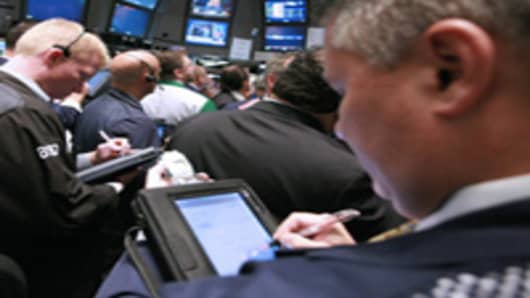This New Year, if your resolution is to give your investment portfolio a much needed boost, you may be in luck.
While the overall market is unlikely to stage a major turnaround any time soon, experts agree there are a handful of investments that are heating up and could help you recoup some gains.
According to Steve Neimeth, portfolio manager of the SunAmerica Value Fund, stocks with high dividend yields—often found in large-cap value stocks—are one pocket of the market that is likely to sizzle in 2009. Dividend yields—how much a stock pays in dividends as a percentage of its price— have risen sharply in the past year with the selloff in the stock market.
This is an environment where it is very difficult to pick up investment returns, Neimeth said. However, "a portfolio of large-cap value stocks that is diversified among sectors can easily be created with dividend yields of 5% or better," he said
Neimeth said an added benefit is that dividends are generally taxed at a rate of 15%, which is low compared with interest income, which is taxed at your personal tax rate.
One high-dividend yielding stock Neimeth likes is Dow component KraftFoods, which offers a dividend yield of 4.4%, according to Mortningstar.com. This stock, he said, is domestically-oriented with slow but stable growth, a good balance sheet, a secure business model, and little risk to the company's dividend.
For The Investor
- Get Updated World Market Indexes Here ...
- Which Markets are Open; Which Aren't
- Venezuela to Start Seizing Gold Concessions as Oil Falls
- Winners of 2008: Stocks That Beat the Market Mess
He also likes Florida Power & Light , which has a dividend yield of 3.6% and is also a slower growth, domestically-oriented stock.
Other stocks that offer very good dividend yields are Bank of America, which has a yield of 9.6% and J.P. Morgan Chase, which has a yield of 5.1%.
However, Neimeth said, while they have much higher dividend yields there could be more risks to their dividend payout if the economy gets worse.
According to Keith Walter, portfolio manager at Artio Global Management, in terms of equity investments, investors can also expect to see some outperformance in stocks that directly benefit from increases in spending on infrastructure such as roadways, railways and electric grids. This is an area that President Elect Barack Obama has expressed plans to focus on once he takes office.
Two stocks in this area that Walter likes are URS and AECOM Technology .
These, he said, are stocks of engineering and contracting companies that secure a lot of government contracts and have already done well as word of spending bills have come out, though analysts haven't yet reflected changes to infrastructure spending.
Video: Investing strategies for 2009
In addition, he said, companies that will benefit from enhancements to the electricity grid also have the potential to outperform including names like General Cable, which is big in high power copper cable business.
Walters said there are also various area of the global equity market that investors should consider in 2009, particularly defensive stocks such as consumer staples and healthcare and companies that have quality balance sheets and offer high dividend yields.
In terms of defensively oriented global stocks, Walter said one name he likes is Swiss-based Nestle .
This stock, he said is a solid, consumer staple which offers a strong dividend yield that it will likely have no problem covering.
In the global energy sector, Walter likes some big cap energy stocks such as France-based Total, which he said is still profitable and has a good and secure dividend yield.
Investors looking for non-equity investments should also considering looking at the high yield bond market in their search for outperformance.
Sabur Moini, a portfolio manager with the Payden High Income Fund said that like everything, the high yield market has gone through a lot of turbulence.
However, "high yield has remained relatively liquid throughout al of this turmoil," he said. "We feel the market has oversold on the downside [and that] much of the weakness is more technical than fundamental."
It is likely that '09 will be a challenging economy, Moini said, though a lot of these companies have good liquidity, good management teams and good capital structures and could offer very good opportunities.
One issue, though, with high yield is the default rate, which Moini believes will likely to increase to from 3% currently to as high as 11% through next 12 to 15 months. That's why the key with these investments is to be selective.
One area within high yield that he likes is healthcare, specifically companies such as DaVita , which is a big high yield issuer.
He also likes high yield offerings from some utilities such as El Paso Electricand Edison International , energy company Chesapeake Energyand cable/telecommunications company DIRECTV Group .
"Those are companies where the bonds are all yielding double digits and these are sectors that we think we do well evening tough economies."
Some high yield areas that Moini urges investors to avoid are auto and auto parts companies, chemicals and more cyclical sectors that have more exposure to a tough economy such as retailers, restaurants and homebuilders.
Investors who are looking for alternatives to spice up their portfolio may also consider managed futures. These investments are trend followers that generally track movements in areas such as commodities, currencies, equities and fixed income.
For instance, they often seek to profit when prices of commodities like energy, metals and agricultural markets rise.
Ed Egilinsky, managing director of alternative strategies at Rydex Investments said while there are very few asset classes that had a good year in '08, one area was managed futures and that is likely to persist into 2009.
This is particularly true, he said of commodities and interest rate currencies.
"Most of the managed futures industry relies on price trend regardless of direction," he said adding that if there is directional volatility regardless of whether it is up or down, investors can benefit from an investment in managed futures.
Managed futures funds, he said are also a good compliment to a stock and bond portfolio as they generally have a low correlation to stocks and bonds and are especially good when those core investments are having a tough time.
One way to get exposure to managed futures is through a mutual fund.
For instance, Rydex offers the Rydex Managed Futures Fund.
They can also be accessed through a commodity pool, though Egilinsky said these don't always have daily liquidity and sometimes investors have to meet a minimum level of net worth.
Though 2008 was a rough year for most investors and many expect 2009 to be largely more of the same, investors who take the time to play their cards right could find some good opportunities for outperformance.



